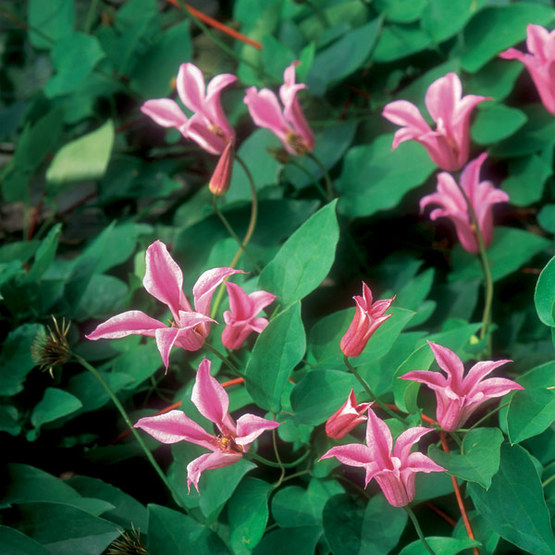
Gardeners are a helpful bunch, always eager to pass along useful tips. Though we can learn a great deal this way, we shouldn’t be surprised that some bad information keeps getting spread around. Here are three often-heard myths about clematis you should ignore.
Myth 1: Plant their head in the sun and feet in the shade.
Using other plants to cover a clematis’s roots can actually impede the vine’s growth. I nearly choked several of my plants a few years ago by “shading their feet” with bacopa. After that near-fatal experience, I started removing plants from the base of my clematis, and the results have been positive. So if your clematis are not at their best, you might want to eliminate the plants at their base. Being a great companion plant, clematis are socializers, but their roots are loners. Clematis don’t need shaded roots any more than any other plant. Most wholesale nurseries I have visited over the years grow clematis in full sun. It’s their business to grow plants. If they felt it would improve their clematis crop production, wouldn’t you think they would be shading the base of the containers?
Myth 2: They can’t take the heat.
Though some clematis need a winter chill to bloom, most do not. This myth is based on the theory that clematis go dormant when temperatures exceed 80°F for an extended period. It’s surprising that this theory became so pervasive because no studies have been done on this issue.
I have seen plenty of clematis thriving in this allegedly excessive heat, including some growing all summer in black containers on black asphalt in temperatures up to 105°F. I know many gardeners who successfully grow clematis in hot places like the Nevada desert. I have never seen a clematis shut down and fail to flower because of heat.
Myth 3: They are lime lovers.
Clematis are no different from the majority of the other cultivated plants in your garden in that they thrive in slightly acidic conditions. They prefer a pH level of 6.5, where the plants absorb the maximum nutrients from the soil. One of the world’s largest producers of clematis grows his plants in a medium with a pH level of 5.5, and they suffer no adverse effects.
Fine Gardening Recommended Products
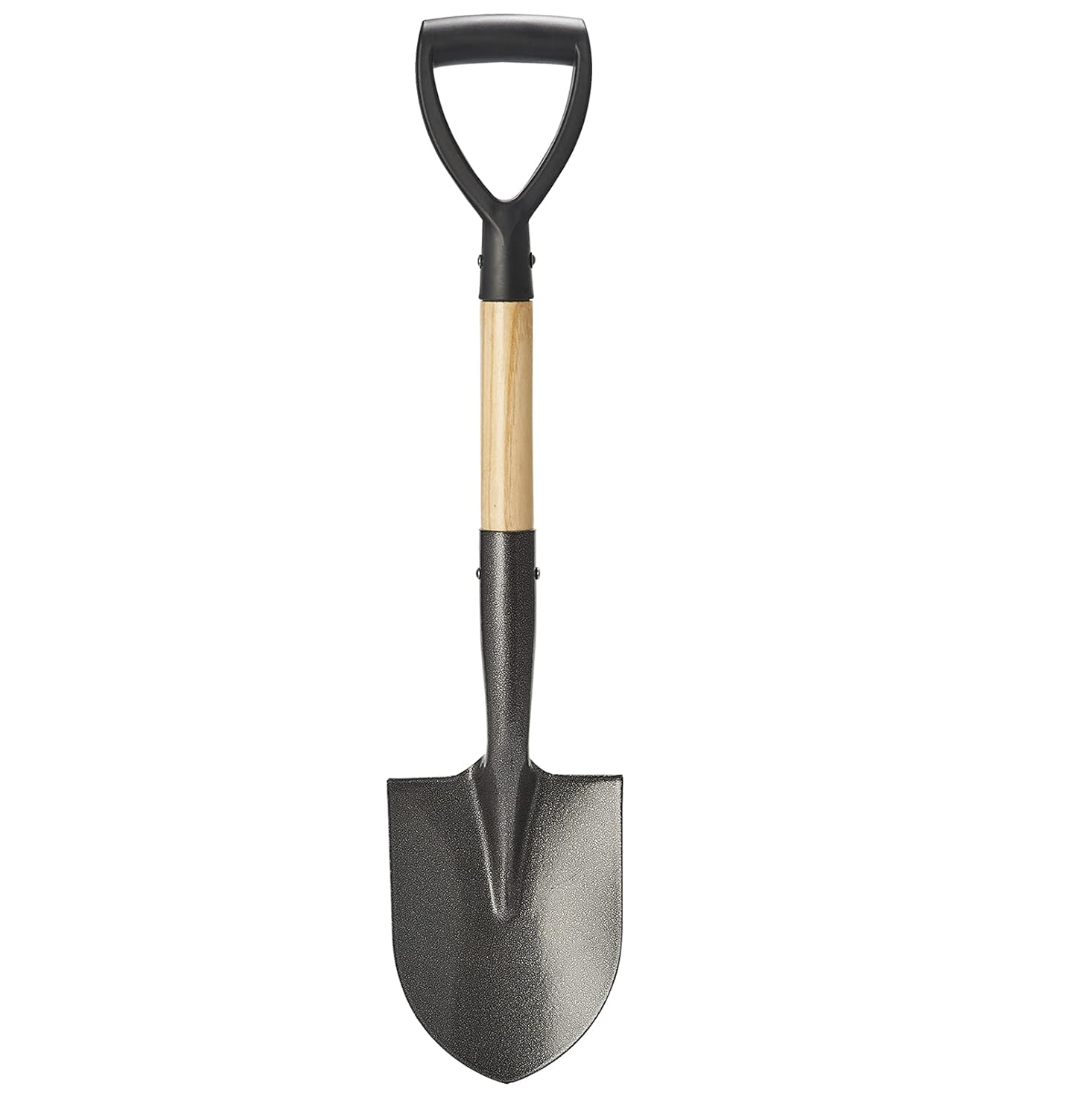
Corona® Multi-Purpose Metal Mini Garden Shovel
Fine Gardening receives a commission for items purchased through links on this site, including Amazon Associates and other affiliate advertising programs.

DeWit Spork with Solid Socket
Fine Gardening receives a commission for items purchased through links on this site, including Amazon Associates and other affiliate advertising programs.


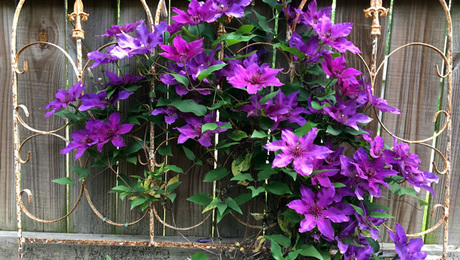

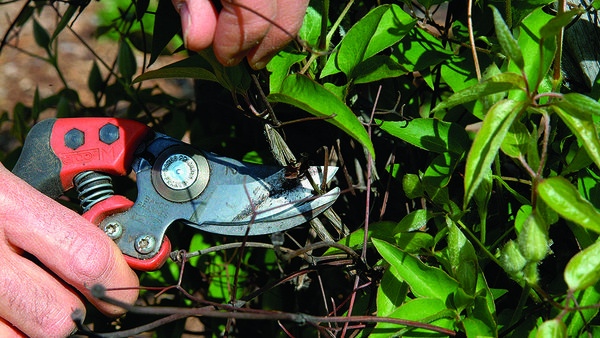


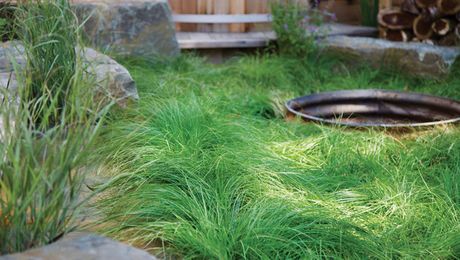










Comments
I have great gardens, but I have long said that Clematis die by my just looking at them. However I purchased 4 plants this spring to try to redeem my track record. To date they have NOT died! However I have had only 2 blooms on one plant, and my tallest plant is about 4 feet high on one single trailing vine. I did plant them behind something else as has always been recommended---2 and 2, with brand new soil and nice new trellises, so I think they are just holding out till the end of summer to be polite.
Oh Barb! Don't get discouraged! You'll see a huge improvement by next year!!!
Is it also a myth that clematis should be cut down every year? I do not and have annual bloom.
The cutting back to a height of 1.5 to 2 feet has more to do with keeping woody growth to a minimum. I've been told by many that the east side is the best place to plant and have had terrific results following this rule
Oh, my gosh, this is something I needed to read. I had been a believer of 2 out of 3...now I know better.
Clematis also seem to do well in part sun and shade but transplanting can be difficult. I tried to move a pale pink double clematis with Duchess in the name after a storm blew down a privacy fence edging the patio. Its root ball was so huge(2' x 3') I had to move it with a wheelbarrel and I know I didn't get all the roots. I can see why these vines are so tough. I should have put up a trellis and called it a day.
Some clematis require hard pruning, some only bloom on old wood and some will do either.
I have had much good lock with Clematis.I grow mine in pots on my deck because my yard backs up to the woods and my plant is always full those beautiful flowers as they are RIGHT NOW!
I really protect my clematis the first year (we are in zone 4) with a Styrofoam cover and I am sure to water it very well before putting it to bed for the first time. Both my Clematis-one is 'Nelly Moser' and older but beautiful. The youngster is 'Still Waters ' and doing fine. But he is going to get jamies on before the winter so he comes back next year.
Hi there, just saw your comment in regards to clematis with Styrofoam cover, is this correct? Can you give me more info or ideas as to the outcome of your clematis. Is my first time planting clematis, and to be honest I really don't want to plant anything around it, and I read somewhere that placing stone/rocks attracts slugs. Please advice???
So it is very early spring here in Wis. 2017. To answer your question-I keep the newest planted Clematis covered probably until mid May. First You have to know what kind of Clematis you have. My Nelly Moser needs to be pruned back in the late summer. Last year I got a second bloom out of it. NOT all Clematis are created equal! Some will not react well to pruning! I have a small one-Lincoln Star that I covered last fall. We will see if it comes up again. They do not like intense heat, so if you live in 8 or better you may think of shading it. Fertilize them well in the spring and I fertilize after the bloom to. I have small Styrofoam coolers that I get medicine in (I'm diabetic) and they are just perfect for covering my plants. Put a rock on top so they won't blow off. You may be able to get some from your local Veterinarian as they get meds delivered in these all summer long. My Nelly seems to be happier with something to climb on. Just an observation. I hope I have helped! Catch me again if you need more "expert" (ya right) advice on Clematis!!! Good Luck! Oh-I leave the base bare and keep the debris cleaned up. I have had no prouble with snails but don't wat trouble either.
We have a summer cottage in Southern Ontario. I planted Clematis 4-5 years ago. Every year about mid-June they start getting brown at the bottom and it moves up the vines.It is very un-sightly. I know the soil is not very good and I have added lime as we have lots of pines. I thought it was because the garden is soil over rock, and that their "feet" are to warm due to the rock. They have at lease 12-18 inches of soil. But, you say warm feet should not matter. I have forgotten what species they are. I prune them back in the Spring and they look good for about two months. They flower, but the flowers are small. This year I tried composted cow manure, same result. The area they are in gets a fair amount of wind, but they are on a trellis. I water them regularly. HELP, please.
Log in or create an account to post a comment.
Sign up Log in